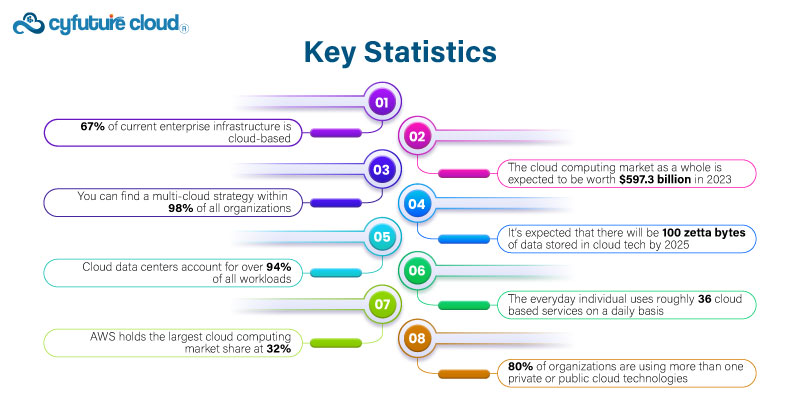Table of Contents
- Unveiling the Power of Cloud Hosting Solutions
- What advantages may a cloud hosting solution offer?
- How the Cloud Is Being Used by Different Industries
- Hosting in the Cloud: Embracing the Future
- 1. Developments in Generative AI
- 2. Soft Skills Are Stressed
- 3. Business Practices That Are Sustainable
- 4. Models of Remote and Hybrid Work
- 5. Digital Shift
- 6. Cybersecurity and data privacy
- 7. Personalisation and Customer Experience
- 8. The expansion of online shopping
- 9. Remote Collaboration Tools
- 10. Augmented reality (AR) and virtual reality (VR)
- 11. Blockchain Technology
- 12. Automation and Robotics
- 13. Data analytics and organisational intelligence
- 14. The Wellness and Health Industry
- 15. Applying AI to Boost Customer Service
- 16. The suppleness of the network
- 17. Distance Learning and Retraining
- 18. Subscription-based business models
- 19. Social media marketing and influencer partnerships
- 20. Transition to Green Energy
- 21. Telemedicine and Remote Healthcare
- 22. Project Management with Agile
- 23. Search Engine Optimisation for Voice
- 24. Taking Social and Environmental Issues Accountably
- The Impact Of Cloud Hosting Solutions On Business Models: Opportunities And Challenges
In the current dynamic digital environment, companies want not just to endure but also to thrive. Using technology to increase productivity and promote competition is essential to succeeding in this cutthroat market. Among these innovations in technology, Cloud Hosting Solutions have become a mainstay, transforming how companies function and compete in the digital age.
The market was valued at $371.4 billion in 2020. Based on a 17.5 percent compound annual growth rate (CAGR), the market is expected to reach $832.1 billion by 2025.
Unveiling the Power of Cloud Hosting Solutions
Scalability and Agility: The Foundation of Efficiency
Cloud hosting’s unmatched scalability and agility are its key components. This feature enables companies to adjust resources up or down in response to changing needs in a flexible manner. This flexibility guarantees the best use of resources at all times, whether they are busiest or less busy, which simplifies processes and increases productivity.
Expense Effectiveness: Unlocking Economic Potential
The pay-as-you-go nature of cloud hosting has completely changed the economics of IT infrastructure. The days of making significant upfront expenditures in infrastructure and technology are long gone. These responsibilities are removed by cloud solutions, which provide an affordable substitute where companies just pay for the resources they use. This is a desirable alternative for companies of all sizes since it lowers both capital investment and operating costs.
Worldwide Reach: Rethinking Cooperation
The workplace has been changed by cloud hosting’s ubiquitous accessibility. Teams that are dispersed geographically may work together without difficulty as they can access programmes and data from any location with an internet connection. Because of its widespread accessibility, which has eliminated geographical obstacles and enabled effective cooperation, productivity has increased.
Strengthened Protection: Defending the Digital Frontier
In the digital era, security is of utmost importance, and cloud hosting does not disappoint in this regard. Strong security precautions are used by reputable cloud service providers, who also include firewalls, encryption, frequent upgrades, and compliance certifications. Customers and other stakeholders would feel more confident knowing that data integrity and safety are ensured.
Performance and Reliability: The Foundation of Competitiveness
Competitivity is based on reliability. Cloud solutions ensure excellent performance and little downtime thanks to their sophisticated architecture and failover controls. Maintaining smooth business operations, improving client experiences, and obtaining a competitive edge all depend heavily on this dependability.
Innovation and Strategic Edge
Innovation is encouraged by the access to cutting-edge technology that cloud hosting solutions offer. Companies may quickly implement innovations, try out new apps, and stay ahead of the curve in their respective fields. Maintaining a competitive advantage is greatly aided by this inventive agility.
What advantages may a cloud hosting solution offer?
Solutions for cloud hosting have several advantages and are completely changing how companies run and maintain their IT infrastructure. Here are a few main benefits:
Scalability: Cloud hosting enables exceptional scalability, allowing organisations to change how they deploy their resources to meet demand. This adaptability guarantees efficient resource utilisation, permitting a range of workloads without demanding large hardware adjustments.
Economy of scale: Pay-as-you-go solutions eliminate the need for large upfront expenditures in physical infrastructure by allowing firms to simply pay for the resources they actually utilise. This is an advantageous option for businesses financially because it lowers capital and operating costs.
Global Accessibility: With cloud hosting, users may access data and applications from any location with an internet connection. This global accessibility promotes remote work, facilitates geographically dispersed teams’ collaboration, and increases productivity.
Enhanced Security Measures: Reputable cloud service providers include firewalls, encryption, compliance certifications, and frequent security upgrades as part of their rigorous security processes. The knowledge that data is safeguarded and preserved in this manner will instill more confidence in customers and stakeholders.
Effectiveness and Dependability: Cloud solutions leverage cutting-edge technology to deliver peak performance and little downtime. Backup systems and redundancy measures are used to reduce the risk of service disruptions and enable smooth company operations.
Innovation and Agility: Thanks to cloud hosting’s access to cutting-edge technology, businesses may experiment with new applications, adopt advancements fast, and stay ahead of the curve. This adaptability fosters creativity and preserves a competitive edge.
Data Recovery and Backups: Data Recovery and Backups: Services for cloud hosting frequently come with features for automated data backup and recovery. This ensures business continuity and disaster recovery capabilities by guarding against data loss or system failures.
Environmentally friendly: Compared to traditional on-premises infrastructure, cloud hosting uses less energy and has a lower carbon footprint due to resource sharing and optimum resource utilisation.
How the Cloud Is Being Used by Different Industries
A wide range of sectors use cutting-edge cloud hosting technologies to improve efficiency, develop services, and change operations:
- Healthcare Industry: In this field, cloud hosting ensures secure data storage, fosters system interoperability, and makes telemedicine services possible. It makes secure medical information sharing between healthcare providers possible, enhances diagnostic tools with artificial intelligence, and makes remote patient monitoring easier.
- Finance & Banking: With the use of cloud technology, financial institutions can safely handle large transaction volumes, follow legal requirements, and offer personalised customer experiences. Applications like risk assessment, real-time fraud detection, and mobile banking benefit from scalable cloud infrastructure.
- Retail and e-commerce: Cloud hosting enables businesses to manage inventory, streamline supply chains, and offer personalised shopping experiences. It improves e-commerce systems, enables predictive analytics for demand forecasting, and streamlines order fulfilment and processing.
- Media & Entertainment: Media companies utilise cloud hosting to store, broadcast, and distribute their content. It facilitates effective processes for content production, personalised content recommendations, on-demand streaming services, and global content distribution.
- Manufacturing and Logistics: Cloud technology may assist improve supply chains, inventory control, and industrial processes. IoT device integration with cloud connectivity enhances overall operational efficiency by enabling data-driven decision-making, predictive maintenance, and real-time tracking.
- Education Sector: Distance learning, virtual classrooms, and collaborative learning platforms are made possible by cloud hosting. It enables the improvement of learning outcomes through the use of analytics, centralised content management, and educational applications.
- Automotive Industry: Cloud-based technologies that enable linked autos provide data-driven services like GPS navigation, predictive maintenance, and over-the-air software upgrades. Cloud computing solutions are also useful for managing the enormous amounts of data that automobiles produce.
- Telecommunications: Cloud hosting enhances network agility and fosters virtualization, hence enabling the deployment of 5G services. It facilitates the rapid introduction of new services, network optimisation, and cost-effective infrastructure scalability.
Advanced cloud hosting fosters innovation, scalability, flexibility, and cost-efficiency in each of these sectors, enabling digital transformation and giving businesses a competitive edge in a changing marketplace.

Hosting in the Cloud: Embracing the Future
Cloud hosting solutions are a game-changer that enable companies to prosper in the digital age. It is impossible to overestimate their contribution to improving productivity, cutting expenses, bolstering security, and offering the flexibility required to remain competitive. Using Cloud Hosting Solutions’ power becomes more than simply a benefit as companies manage the constantly changing digital ecosystem.
Cloud hosting solutions are in the front of the digital revolution, guiding companies towards unheard-of efficiency and competitiveness.
As 2024 approaches, business professionals must be abreast of any new changes that can have an influence on the corporate sector. These advancements will have a big influence on many different industries and present chances for innovation and growth. The top 24 business trends for 2024 that leaders in the business sector should be aware of are listed below:
1. Developments in Generative AI
Business procedures will be completely transformed by generative AI, which will make predictive analytics, personalised consumer experiences, and automated content production possible.
2. Soft Skills Are Stressed
Businesses will place a high emphasis on soft skills like communication, emotional intelligence, and flexibility as they realise how important human connection is in the digital age.
3. Business Practices That Are Sustainable
Businesses will place a high priority on sustainability, emphasising corporate social responsibility, eco-friendly operations, and responsible supplier chains.
4. Models of Remote and Hybrid Work
With companies implementing hybrid work models that provide workers flexibility and a work-life balance, remote work will only grow in popularity.
5. Digital Shift
Businesses will accelerate their digital transformation projects by using technology like automation, big data analytics, and cloud computing to improve customer experiences and streamline operations.
6. Cybersecurity and data privacy
In view of the increased threat of cyberattacks, businesses will prioritise cybersecurity measures and invest in robust data privacy policies to protect sensitive information.
7. Personalisation and Customer Experience
Businesses will focus on giving customers personalised experiences by utilising AI and data analytics to understand their preferences and provide goods and services that are tailored to them.
8. The expansion of online shopping
Businesses will keep investing in online platforms, easy payment choices, and last-mile delivery services to meet the growing demand for online shopping, which will create a booming e-commerce sector.
9. Remote Collaboration Tools
Modern technology and remote collaboration solutions will be used by enterprises to provide seamless communication and cooperation amongst personnel who are located far away.
10. Augmented reality (AR) and virtual reality (VR)
There will be uses for AR and VR technology in a variety of industries, including real estate, retail, and training. These innovations will increase customer engagement and offer immersive experiences.
11. Blockchain Technology
Blockchain will become more widely used in business operations to provide secure and transparent transactions, digital identity verification, and supply chain management.
12. Automation and Robotics
Automation and robotics will continue to transform industries by boosting output, reducing costs, and freeing up resources for higher-value tasks.
13. Data analytics and organisational intelligence
Businesses will employ data analytics and business intelligence technology to gain actionable insights, make strategic choices, and drive growth.
14. The Wellness and Health Industry
The number of businesses in the health and wellness space offering products and services to improve mental and physical health will rise significantly.
15. Applying AI to Boost Customer Service
Artificial intelligence (AI)-powered chatbots and virtual assistants will enhance customer service by providing customers with timely, personalised support.
16. The suppleness of the network
Businesses will prioritise building strong supply chains, diversifying their sourcing strategies, and utilising technology in order to prevent disruptions and ensure continuity.
17. Distance Learning and Retraining
There will be an increase in demand for remote learning and upskilling courses from companies that invest in staff development and adapt to the changing skill requirements.
18. Subscription-based business models
It is anticipated that subscription-based business models would become more popular since they provide businesses recurring revenue streams, consumer convenience, and customised experiences.
19. Social media marketing and influencer partnerships
Influencer alliances and social media platforms will be used by businesses to engage with their target audience, build brand awareness, and foster more customer contact.
20. Transition to Green Energy
Businesses who want to lower their carbon footprints will invest in solar, wind, and other green energy alternatives, hastening the shift to renewable energy sources.
21. Telemedicine and Remote Healthcare
The demand for telemedicine and remote healthcare services will only increase as they offer patients easier access to medical specialists and enhance patient outcomes.
22. Project Management with Agile
Businesses will use agile project management techniques to improve teamwork, flexibility, and project execution efficiency.
23. Search Engine Optimisation for Voice
Businesses will ensure their online presence is voice search optimised as voice assistants and smart speakers gain traction with consumers.
24. Taking Social and Environmental Issues Accountably
Businesses are expected to demonstrate their commitment to social responsibility and environmental stewardship by addressing issues such as diversity and inclusion, climate change mitigation, and community participation.
The Impact Of Cloud Hosting Solutions On Business Models: Opportunities And Challenges
|
Impact Aspect |
Opportunities |
Challenges |
|
Scalability |
– Flexibility to scale resources based on demand. – Accommodates rapid business growth. – Cost-effective resource allocation. |
– Managing sudden scalability demands efficiently. – Control over costs during rapid scaling |
|
Cost Efficiency |
– Reduced capital expenditure on hardware. – Pay-as-you-go models lower operational costs. – Elimination of hardware maintenance expenses. |
– Initial migration costs and training for new systems. – Unexpected overages leading to increased costs. |
|
Global Accessibility |
– Facilitates remote work and global collaboration. – Enhances productivity and access to resources from anywhere. |
– Ensuring consistent and reliable internet connectivity. – Potential data security and compliance concerns. |
|
Enhanced Security Measures |
– Access to top-tier security infrastructure and protocols. – Regular updates and compliance certifications. – Data encryption and protection. |
– Dependency on third-party security measures and protocols. – Potential data breaches or security vulnerabilities. |
|
Reliability and Performance |
– High-performance levels and minimal downtime. – Redundancy measures for service continuity. – Improved user experiences and customer satisfaction. |
– Reliance on external service provider’s uptime and reliability. – Potential performance issues during high demand periods. |
|
Innovation and Agility |
– Access to advanced technologies and tools. – Quick deployment of innovations and applications. – Ability to experiment and innovate swiftly. |
– Cultural shift towards embracing innovation and change. – Balancing speed with maintaining quality and reliability. |
|
Data Backups and Recovery |
– Automated backups and robust disaster recovery capabilities. – Protection against data loss and system failures. – Enhanced business continuity planning. |
– Ensuring consistency and reliability in data backups. – Potential recovery time and data integrity challenges. |
|
Environmental Impact |
– Reduced energy consumption and carbon footprint. – Efficient resource utilization and lower hardware requirements. |
– Lack of direct control over energy efficiency measures. – Balancing environmental concerns with operational demands. |
Recent Post
Send this to a friend

 Server
Colocation
Server
Colocation CDN
Network
CDN
Network Linux
Cloud Hosting
Linux
Cloud Hosting Kubernetes
Kubernetes Pricing
Calculator
Pricing
Calculator
 Power
Power
 Utilities
Utilities VMware
Private Cloud
VMware
Private Cloud VMware
on AWS
VMware
on AWS VMware
on Azure
VMware
on Azure Service
Level Agreement
Service
Level Agreement 




















